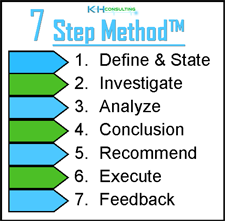KandH Consulting 7 Step Method™
7 Step Method™
 |
Figure 1 |
Driving change with standardization removes potential influence of the process itself. Although many companies profess to engage in a systematic approach, individual representatives can influence the process leading to further issues, extended project duration, added charges for unforeseen developments, incomplete objectives, and inconsistent performance. The KandH Consulting 7 Step Method™ is designed to manage change within an organization using a sequential path that is adaptable to parameters of a particular scope. Potentially cyclical in nature, this method delivers measureable results in relation to defined expectations and goals. Use of this method is the cornerstone of our fixed cost and 100% guaranteed deliverables.
The seven steps graphically demonstrated in Figure 1 act as a task aid in forming proper scope, execution, and deliverables while leaving room for process improvement.Step 1: Define Scope and State Expectations
A clearly laid out project scope enables stakeholders to understand expectations, evaluate potential influencers, link with decision-makers, and create the proper environment for benefactors to assess performance. To do this expectations and goals are clearly defined, judged realistic, worthwhile, comparable to standards, measurable, and time-sensitive.
Step 2: Investigate
Essential to the process is use of investigative techniques like observation, fact-finding interviews, and review of gathered documents. Cataloging and sorting of the pertinent data at the same time efficiently provides the foundation for analysis.
Step 3: Analysis of Data
Analysis begins with careful definition of items of interest and its objective in terms of stated need. The results are compared and contrasted against theory, current trends, process, and procedures to ascertain effectiveness. Qualitative and quantitative analysis is used in tandem with ranking and prioritizing of results.Step 4: Draw Conclusions
In this step conclusions are developed from findings and summary statements are recorded taking into consideration needs and expectations. Results are structured to confirm areas of potential change.
Step 5: Recommendations for Change
Using conclusions made and a criterion for measurement, recommendations are ranked and built into a milestone-based action plan that is measurable and time-sensitive.
Step 6: Execute Action Plan
The steps set forth in the action plan are performed and evaluated based on completion of listed tasks. Success is evaluated throughout the process and necessary changes are noted to be addressed through subsequent planning.
Step 7: Feedback Mechanism
Feedback is critical in any process and needs to be facilitated by a controlled method which includes participation of stakeholders, gathering and analysis of post-execution data, and ways to define potential areas of change. The process should encourage positive communication among stakeholders rather than create confrontation or analysis paralysis.
For a convenient list of the individual steps, please download our brochure by clicking HERE.
